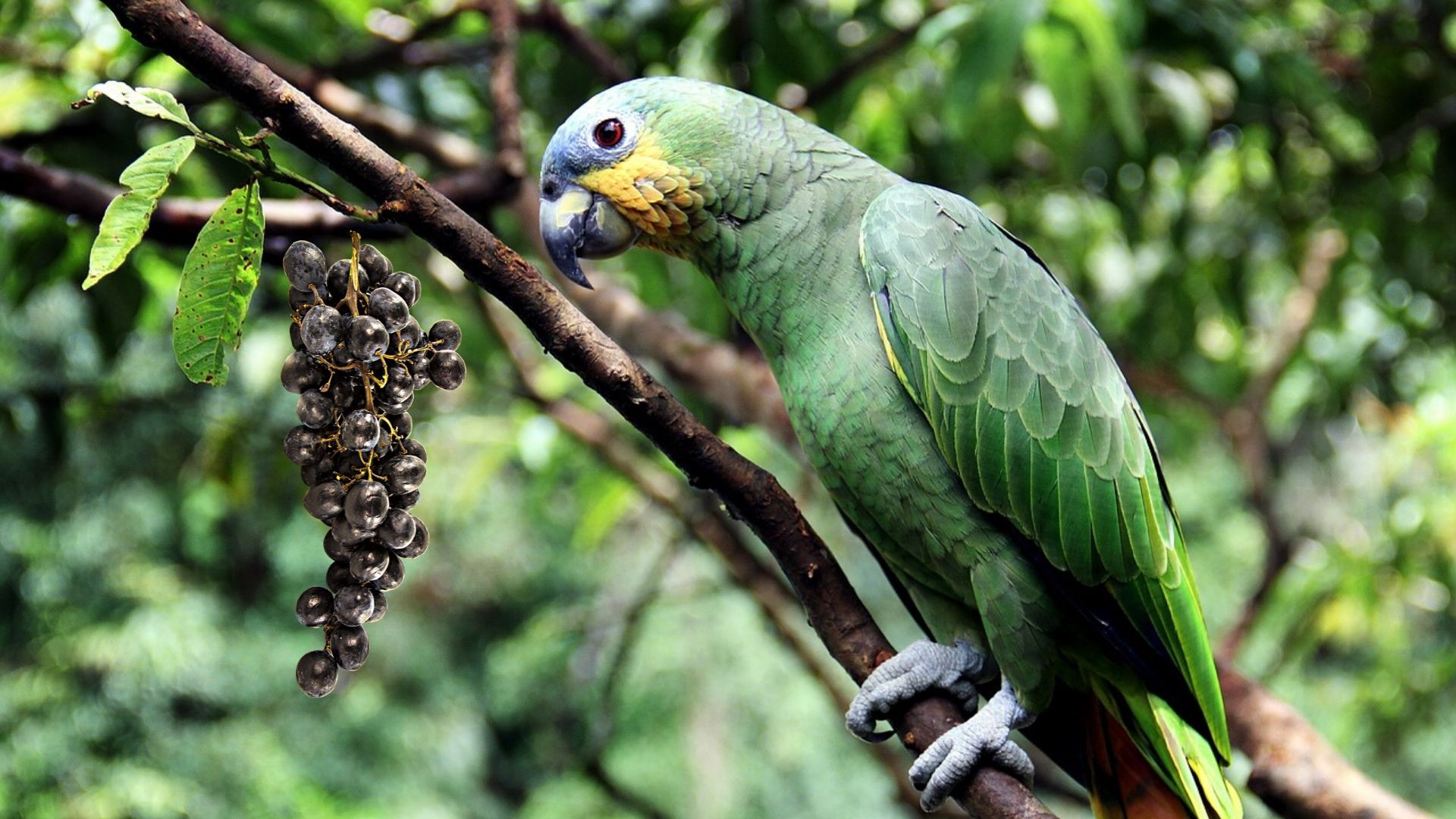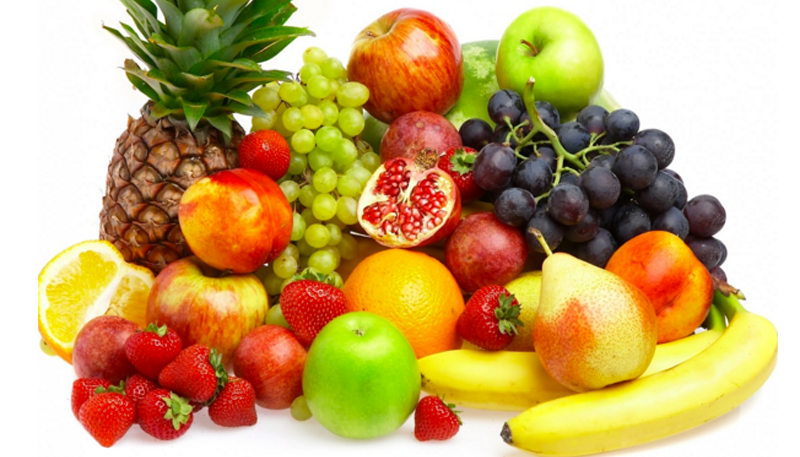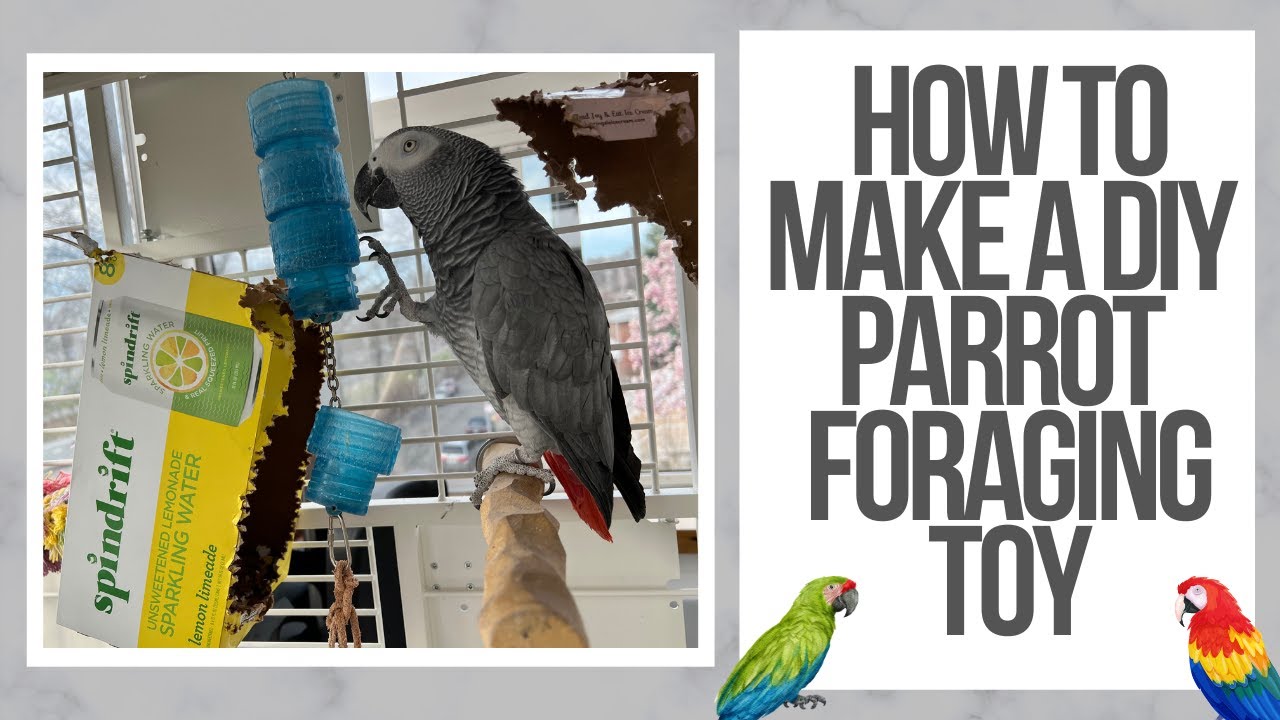Can Parrots Have Grapes? Everything You Need To Know About Giving Grapes To Your Parrot
Can parrots have grapes? Yes, but only in moderation. Read our guide on how to feed grapes to your parrot safely and responsibly.
Author:Maya ReyesReviewer:Sophia HarperOct 02, 202321.7K Shares529.6K Views

Can parrots have grapes? It's a question that many parrot owners ask, as grapes are a popular fruit that is often enjoyed by humans. The answer is yes, parrots can eat grapes, but only in moderation. Grapes are a good source of vitamins, minerals, and antioxidants, but they are also high in sugar and calories. Too much sugar and calories can lead to weight gain and other health problems in parrots.
It's important to understand the suitability of grapes for parrots so that you can feed them a healthy and balanced diet. This article will provide a brief overview of the topic, address common misconceptions, and offer tips on how to feed grapes to your parrot safely.
Parrots are delicate creatures with unique nutritional needs. It's important to understand what foods are safe for them to eat and which foods should be avoided. Grapes are generally safe for parrots to eat, but they should be given as a treat, not as a staple of their diet. Too many grapes can lead to weight gain, obesity, and other health problems.
There are a few common misconceptions about whether or not parrots can have grapes. One misconception is that all grapes are toxic to parrots. This is not true. While some types of grapes, such as wild grapes, can be toxic to parrots, most cultivated grapes are safe for them to eat.
Another misconception is that parrots can eat grape seeds and stems. This is also not true. Grape seeds and stems can be a choking hazard for parrots. It's important to remove the seeds and stems before feeding grapes to your parrot.
The Nutritional Benefits Of Grapes For Parrots
Grapes are a good source of vitamins, minerals, and antioxidants that are beneficial for parrots. Here is a breakdown of some of the key nutrients found in grapes and their impact on bird health.
Vitamins And Minerals Found In Grapes
Vitamins
- Vitamin A - Essential for vision, immune function, and cell growth.
- Vitamin C - Boosts the immune system and helps to protect cells from damage.
- Vitamin K - Important for blood clotting and bone health.
Minerals
- Potassium - Regulates blood pressure and fluid balance.
- Magnesium - Helps to maintain muscle and nerve function.
- Iron - Carries oxygen throughout the body.
Antioxidants
Grapes contain a variety of antioxidants, including resveratrol, quercetin, and anthocyanins. Antioxidants help to protect cells from damage caused by free radicals. Free radicals are unstable molecules that can damage cells and contribute to chronic diseases such as cancer and heart disease.
Impact Of Antioxidants On Bird Health
Antioxidants are particularly important for parrots, as they are exposed to a high number of free radicals in their environment. Free radicals can be produced by exposure to air pollution, cigarette smoke, and sunlight. Antioxidants help to neutralize free radicals and protect parrots from the harmful effects of oxidative stress.
Balancing The Benefits With Potential Drawbacks
While grapes offer a number of nutritional benefits for parrots, it's important to balance these benefits with the potential drawbacks. Grapes are high in sugar and calories, so they should be given to parrots in moderation. Too much sugar and calories can lead to weight gain, obesity, and other health problems.
It's also important to note that some types of grapes, such as wild grapes, can be toxic to parrots. It's best to only feed your parrot cultivated grapes that have been purchased from a reputable source.
Grapes can be a healthy treat for parrots in moderation. Be sure to wash the grapes thoroughly, remove the stems and seeds, and cut them into small pieces before feeding them to your parrot.
Moderation Is Key - Understanding Serving Sizes
It's important to feed grapes to parrots in moderation. The recommended portion size will vary depending on the species of parrot. Here are some general guidelines,
- Small parrots (e.g., budgies, cockatiels) - 1-2 grapes per week
- Medium parrots (e.g., African greys, Amazon parrots) - 2-3 grapes per week
- Large parrots (e.g., macaws, cockatoos) - 3-4 grapes per week
It's also important to consider your parrot's overall diet when determining how many grapes to give them. If your parrot is already eating a diet that is high in sugar and calories, you may want to give them fewer grapes.
How Often Should Grapes Be Offered?
Grapes should be offered to parrots no more than 2-3 times per week. It's important to give your parrot a variety of fruits and vegetables to ensure that they are getting a balanced diet.
Combining Grapes With Other Fruits For A Balanced Diet
Grapes can be combined with other fruits to create a healthy and balanced diet for your parrot. Here are some ideas for fruit combinations,
- Grapes, berries, and melon
- Grapes, banana, and apple
- Grapes, mango, and papaya
You can also mix grapes with other foods, such as vegetables, nuts, and seeds, to create a more complete meal for your parrot.
Here is an example of a balanced diet for a medium-sized parrot,
- Breakfast - Pelleted diet with a small amount of fresh fruits and vegetables (e.g., grapes, berries, melon)
- Lunch - Sprouted seeds and nuts
- Dinner - Pelleted diet with a small amount of fresh fruits and vegetables (e.g., grapes, banana, apple)
By following these tips, you can ensure that your parrot enjoys grapes safely and as part of a healthy and balanced diet.
Potential Risks And Considerations
While grapes are generally safe for parrots to eat in moderation, there are a few potential risks and considerations to keep in mind.
Grape Seeds
Grape seeds can be a choking hazard for parrots. It's important to remove the seeds before feeding grapes to your parrot.
Allergic Reactions And Sensitivities
Some parrot breeds may be allergic to grapes or have sensitivities to the sugar content. If you notice any signs of an allergic reaction, such as swelling, hives, or difficulty breathing, stop feeding grapes to your parrot and contact your veterinarian immediately.
Overindulgence
As mentioned previously, grapes are high in sugar and calories. Too many grapes can lead to weight gain, obesity, and other health problems. It's important to monitor your parrot's food intake and make sure that they are not overindulging in grapes.
Here are some tips for monitoring for signs of overindulgence,
- Weigh your parrot regularly and track their weight over time.
- Check your parrot's body condition score to assess their overall health.
- Be aware of any changes in your parrot's appetite or eating habits.
- If you notice any signs of obesity, such as excessive belly fat or difficulty breathing, stop feeding grapes to your parrot and contact your veterinarian.
By being aware of the potential risks and considerations, you can help ensure that your parrot enjoys grapes safely.
- It's best to feed your parrot organic grapes, if possible. Organic grapes are grown without the use of pesticides and herbicides, which can be harmful to parrots.
- If you are unable to find organic grapes, be sure to wash the grapes thoroughly before feeding them to your parrot.
- You can also offer your parrot frozen grapes as a refreshing treat on hot days.
By following these tips, you can help ensure that your parrot enjoys grapes safely and as part of a healthy and balanced diet.
Safely Introduce Grapes To Your Parrot
Washing And Preparing Grapes For Consumption
Before feeding grapes to your parrot, it's important to wash them thoroughly to remove any dirt, pesticides, or other contaminants. You can wash grapes by running them under cold water for several seconds. You can also soak the grapes in a bowl of water with a few drops of vinegar for a few minutes.
Once the grapes are washed, you can remove the stems and seeds. Grape seeds can be a choking hazard for parrots, so it's important to remove them before feeding grapes to your parrot.
You can cut the grapes into small pieces so that your parrot can easily eat them. This is especially important for smaller parrots with smaller beaks.
Offering Grapes In A Way That Encourages Natural Foraging Behavior
Parrots are natural foragers, so it's important to offer them grapes in a way that encourages this behavior. You can do this by hiding the grapes in their cage or play area. This will give your parrot a sense of accomplishment and challenge.
You can also offer grapes to your parrot on a skewer. This will allow them to use their beaks and feet to manipulate the grape, which is a natural behavior for them.
Tips For Observing Your Parrot's Response
It's important to observe your parrot's response when you first introduce grapes to their diet. Some parrots may take to grapes right away, while others may be hesitant. If your parrot is hesitant, try offering them a single grape at a time. You can also try offering grapes in combination with other fruits and vegetables.
If your parrot seems to enjoy grapes, you can start offering them a few grapes a week. Be sure to monitor your parrot's food intake and make sure that they are not overindulging in grapes.
Here are some additional tips for safely introducing grapes to your parrot,
- Start by offering only a small amount of grapes, such as one or two grapes per week.
- Gradually increase the amount of grapes you offer, depending on how your parrot responds.
- Monitor your parrot's food intake and make sure that they are not overindulging in grapes.
- If you notice any changes in your parrot's appetite, eating habits, or body condition, stop feeding grapes to your parrot and contact your veterinarian.
By following these tips, you can help ensure that your parrot enjoys grapes safely and as part of a healthy and balanced diet.
Frequently Asked Questions
Can Parrots Eat Grapes And Raisins?
yes it is safe, but definitely feed in moderation. too many raisins or any other sugar packed food can be bad for your bird and cause fatty liver disease. the best thing to feed your bird is fresh vegetables, pellets, SOME seed and SOME fruit.
Can We Give Dry Grapes To Parrot?
However, it is an important energy source for your parrot and should not be omitted from its diet. However, raisins are heavy in sugar. Therefore, they should only be fed to your parrot a few times a week, along with nuts and seeds, as an energy source.
Can Parrots Eat Rice?
Technically, both raw and cooked rice are safe for parrots. Keep in mind that your bird's ancestors would only encounter raw rice in the wild. Most birds probably won't have strong feelings about raw versus cooked when rice is presented in their meals.
Conclusion
In this comprehensive guide, we've delved into the intriguing question: Can parrots have grapes? The answer is a resounding yes, but with a crucial caveat - moderation is key. Grapes are a treasure trove of essential vitamins, minerals, and antioxidants that can enhance your parrot's overall health. However, their natural sweetness and calorie content should be respected.
By understanding the nutritional benefits of grapes and being mindful of serving sizes, you can offer this delightful treat in a way that enriches your feathered friend's diet. Remember, a varied and balanced nutritional intake is the cornerstone of a happy and healthy parrot.
As we've explored potential risks and considerations, it's evident that responsible grape feeding involves seed removal and vigilant monitoring for allergic reactions. Your parrot's well-being is of paramount importance, and knowing how to safely introduce grapes is an invaluable skill for any bird owner.
While grapes have their merits, they should be part of a diverse diet. We've highlighted a spectrum of fruit and vegetable options, ensuring your parrot enjoys a well-rounded menu. And, as always, consult with avian veterinarians for personalized advice on your unique parrot's dietary needs.

Maya Reyes
Author
Maya Reyes’s wanderlust was sparked in the temples of Luang Prabang, where the scent of lemongrass and the chants of monks revealed the transformative power of travel.
Since then, her journey has been defined by cultural immersion and authentic connections. From learning batik in Indonesia to sharing meals with nomadic families in Mongolia, Maya seeks experiences that highlight the human stories behind each destination.
Travel for her is a way to weave her narrative into the world’s cultural tapestry, creating bridges across diverse ways of life. Maya has traveled to 15 countries and shares her insights through writing and storytelling.

Sophia Harper
Reviewer
Sophia Harper’s photography acts as a portal to the soul of the places she visits. Drawn to South America’s landscapes and cultures, she has spent years capturing everything from the majesty of ancient ruins to the vibrancy of urban streets.
Sophia’s work isn’t just about documenting moments; it’s about evoking the emotions and stories behind them. A dedicated photographer, she has worked with local communities across South America to capture their rich cultural narratives through her lens.
Latest Articles
Popular Articles

